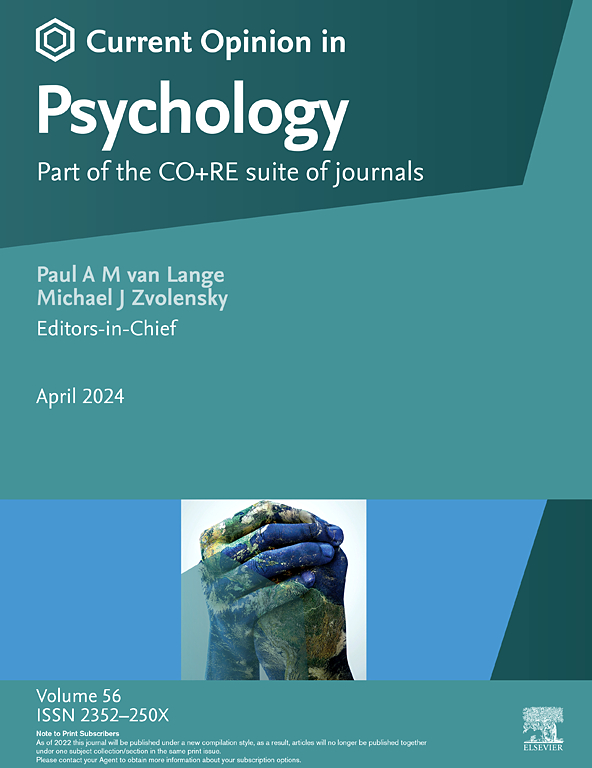短期心态:超越特质和自我调节
IF 6.9
2区 心理学
Q1 PSYCHOLOGY, MULTIDISCIPLINARY
引用次数: 0
摘要
跨期选择的研究一直是心理学家、行为经济学家和认知科学家长期感兴趣的话题。然而,占主导地位的方法往往将时间观与自我调节混为一谈,难以解释个人向短期选择的转变。我们引入了“短期心态”的概念,它反映了优先考虑当前(而不是未来)结果的倾向。虽然短期心态部分是性格使然,但它也会对情境状态(如醉酒、兴奋)、急性事件(如威胁)和更广泛的环境(如邻里暴力)做出反应。至关重要的是,它将时间视角与自我调节能力分离开来。我们提出短期心态理论作为理解跨期选择的一套有用的原则,并概述了测量和实证验证的关键方向。本文章由计算机程序翻译,如有差异,请以英文原文为准。
Short-term mindsets: Beyond traits and self-regulation
The study of intertemporal choice has been a topic of perennial interest to psychologists, behavioral economists, and cognitive scientists alike. Yet, dominant approaches often conflate time perspective with self-regulation and struggle to explain within-person shifts toward short-term choices. We introduce the concept of ‘short-term mindsets’—which reflects the tendency to prioritize immediate (versus future) outcomes. While partly dispositional, short-term mindsets are also responsive to situational states (e.g., intoxication, arousal), acute events (e.g., threat), and broader environments (e.g., neighborhood violence). Crucially, it decouples time perspective from self-regulatory ability. We propose Short-Term Mindsets Theory as useful set of principles for understanding intertemporal choice and outline key directions for measurement and empirical validation.
求助全文
通过发布文献求助,成功后即可免费获取论文全文。
去求助
来源期刊

Current Opinion in Psychology
PSYCHOLOGY, MULTIDISCIPLINARY-
CiteScore
12.10
自引率
3.40%
发文量
293
审稿时长
53 days
期刊介绍:
Current Opinion in Psychology is part of the Current Opinion and Research (CO+RE) suite of journals and is a companion to the primary research, open access journal, Current Research in Ecological and Social Psychology. CO+RE journals leverage the Current Opinion legacy of editorial excellence, high-impact, and global reach to ensure they are a widely-read resource that is integral to scientists' workflows.
Current Opinion in Psychology is divided into themed sections, some of which may be reviewed on an annual basis if appropriate. The amount of space devoted to each section is related to its importance. The topics covered will include:
* Biological psychology
* Clinical psychology
* Cognitive psychology
* Community psychology
* Comparative psychology
* Developmental psychology
* Educational psychology
* Environmental psychology
* Evolutionary psychology
* Health psychology
* Neuropsychology
* Personality psychology
* Social psychology
 求助内容:
求助内容: 应助结果提醒方式:
应助结果提醒方式:


